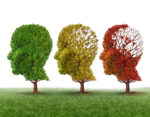My Mother’s Experience With Aphasia
Written by |

According to a statement released by his family last week, actor Bruce Willis has been diagnosed with aphasia and is stepping away from his acting career. Aphasia can occur when the part of the brain that controls speech is damaged. Willis’ family didn’t reveal the reason behind his condition, but aphasia is often connected to strokes, Alzheimer’s disease, or other dementias.
We hope none of these is true for Willis and wish him and his family the best as they navigate their new normal.
How aphasia relates to Alzheimer’s disease
If you or a loved one has trouble finding the right words and phrases to communicate, it could signal aphasia. In the mid to late stages of Alzheimer’s disease, my mother exhibited the condition. She had regular checkups at a memory clinic and was fortunate to enroll in a clinical trial.
On one of her diagnostic visits, the doctor pointed to his watch and asked my mother what it was and what its purpose was. Her response was close, but not quite right. She knew its purpose was to tell time, but referred to his watch as a clock. That is an example of aphasia.
Thankfully, she never totally lost the ability to communicate with her family, but often she’d seemingly have the word on the tip of her tongue and couldn’t push it past her lips.
Aphasia appears gradually for people with Alzheimer’s disease, while stroke patients are often afflicted immediately. However, it doesn’t exhibit the same way for every dementia patient. For some, communicating in writing is laborious, as they lose the ability to write words and sentences and, in many cases, are unable to read written words. When they do write, the wrong words land on the paper.
An inability to recognize people and objects is also a symptom of aphasia. Perhaps this is why my mother found it difficult to identify people in photographs. Face-to-face, she knew her children and grandchildren, but often couldn’t pick them out in photos. She’d point at the individual and ask, “Who is that?” I mistakenly thought her eyesight kept her from differentiating one person from another.
During the late stages of Alzheimer’s disease, she didn’t recognize herself in a mirror and asked, “Who is that old woman?” I assume she recognized me in the reflection since she didn’t ask. (Looking back, maybe I was the “old woman” because, in my mom’s mind, she was in her 40s.) Standing in front of the mirror, I would have her touch her nose and the top of her head. As the reflection matched her movements, she’d smile or chuckle and say, “Oh, that’s me.”
Types of aphasia
Anomic aphasia is when a person has difficulty finding the right words. This can cause trouble when communicating events and places, too. Perhaps they confuse weddings with funerals, for example.
Expressive aphasia is when a person knows what they want to say. It’s in their brain, but they can’t pull it out. They may have trouble expressing themselves in writing or speaking. (I believe this was the type exhibited by my mother.)
Global aphasia is when a person cannot communicate. They can’t read or write words and can’t speak words or understand speech.
Receptive aphasia is when the person affected can’t make sense of the words they hear or read. They can hear speech and read the words and sentences, but they can’t understand them.
Don’t ignore the signs
Aphasia is a signal that something negative is happening in the brain. Now, everyone loses a word or two and cannot come up with the correct phrase now and again, but seek attention for yourself or a loved one if aphasia comes on suddenly. It may be a sign of a stroke.
If aphasia develops gradually and becomes more apparent, seek a diagnosis. It could be a sign of dementia. An early diagnosis is crucial, especially now that treatment is available for people in the early stages of Alzheimer’s disease. An early diagnosis can also assist in keeping the disease at bay so that you can live your best life with dementia.
Six days before my mother passed away, she tried to tell me something but kept forgetting it. She called me into the room several times to tell me something, but couldn’t find the words. A few days later, she struggled to get the right words out to my sister, and I feel it was probably what she’d tried to convey to me a few days earlier.
“I am getting ready to go on a long journey,” she said.
We believe she was telling us goodbye and that she was heading home to heaven. We’re thankful that she was able to convey her message, even if it wasn’t quite what she was trying to say; we got it.
Note: Alzheimer’s News Today is strictly a news and information website about the disease. It does not provide medical advice, diagnosis, or treatment. This content is not intended to be a substitute for professional medical advice, diagnosis, or treatment. Always seek the advice of your physician or other qualified health provider with any questions you may have regarding a medical condition. Never disregard professional medical advice or delay in seeking it because of something you have read on this website. The opinions expressed in this column are not those of Alzheimer’s News Today or its parent company, Bionews, and are intended to spark discussion about issues pertaining to Alzheimer’s disease.







Leave a comment
Fill in the required fields to post. Your email address will not be published.